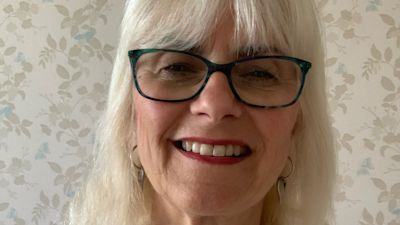The grandmother who donated one of her kidneys to a total stranger - and why she did it

Video report by Hamish Auskerry
A grandmother donated one of her kidneys to a complete stranger after hearing another living organ donor speaking on the radio.
Ceri Nelson, 61, from Porthcawl, said she felt "strongly" that she wanted to do something to help another person less fortunate than herself.
Ceri said: "When I heard that this was something that was possible, it immediately struck a chord with me.
"I was fit and healthy with a full life and I felt strongly that I wanted to do something to help someone who was not as fortunate.
"Not everyone understood my decision but while we can always find reasons not to do something, I prefer to look for reasons why we can."
'I feel it's a wonderful gift to be able to offer someone'
Ceri was put through several months of psychological and physical testing to ensure she was suitable to be a donor.
She then spent five days in hospital while her kidney was removed, before returning back to work three weeks later in the summer of 2017.
All Ceri was told was that her kidney had gone to a man called Neil, who lived in England.
She says she has no regrets and would urge others to consider if they could do the same.
"I feel it's a wonderful gift to be able to offer someone the chance to regain their health", said Ceri.
"Five years on, absolutely I would do it again without a doubt, it hasn't impacted on my life at all. My family were worried at the time but are very proud of me now."
Living donation - when a living person provides an organ for another person who needs it - is relatively unusual, with the majority of kidney patients who receive a donation getting it from a deceased organ donor.
In Wales, 148 people are currently waiting for a kidney donation, after kidney transplants dropped by a third during the pandemic.
Diana Isajeva is one of those 148.
She was studying Law at Cardiff University when began to feel unwell.
After a series of tests and a kidney biopsy, doctors at the Royal Glamorgan Hospital diagnosed Diana with an aggressive form of lupus which had caused her kidneys, heart and lungs to fail.
Diana underwent autoimmune therapy, but it failed to help with her condition. Doctors decided that chemotherapy would be the only way, and Diana began a routine of chemotherapy treatments in the morning and university lectures in the afternoons.
Diana successfully finished law school and became a paralegal, but due to the treatments she was on to help with the lupus her kidneys began to fail and she had to put her career on hold.
She was planning her wedding to her fiancé when the Covid-19 pandemic hit in early 2020 and they had to postpone their plans.
She said: "I felt like my whole life was put on hold because of Covid. I couldn't get married and I was told I had to shield due to being immunocompromised so I felt very alone and almost forgotten about," said the 28 year-old.
"My mental health suffered and at one stage I even considered turning down dialysis or a transplant and opting for palliative care as I thought I would never see an end to the pandemic or my illness.
"But I eventually found solace in a Welsh kidney charity support group and began chatting to a lady who had gone through two transplants and was back on dialysis waiting. She really inspired me not to give up and to enjoy life despite my health problems. So I decided to have the tests and get listed for a transplant."
Due to her other health issues, Diana's best chance of a successful transplant would come from a living donor.
But Diana's mum has health issues and her dad died a few years ago so, being an only child, her only option is a kidney from a stranger.
'It would mean the world to me if I did receive a transplant'
Diana said: "It would mean the world to me if I did receive a transplant and I was allowed to start living life properly, planning my wedding again and embracing the future."
People who wish to make a living donation can either donate to a particular individual, such as a relative or friend, or choose to donate anonymously.
But the majority of kidney patients will still be saved by a deceased organ donor.
The NHS Blood and Transplant service is urging people to tell their loved ones about their organ donation wishes to help those on the waiting list.
Even though the law around organ donation has now changed to an 'opt out' system across Wales, England and Scotland, many are still not aware that families will always be consulted before organ donation goes ahead.
Anthony Clarkson, Director of Organ and Tissue Donation and Transplantation at NHS Blood and Transplant, said: "We know the pandemic is a very worrying time for kidney patients as thousands of people, including children, wait for a life-changing kidney transplant.
"We're pleased that transplant activity is now recovering and we're doing everything we can to enable as many transplants as possible to take place as quickly as possible.
"Sadly patients are facing a longer wait and more people need a kidney transplant, so it is more important than ever for everyone in Wales share their organ donation decision with their family to help others after your death. And if anyone in Wales is willing to consider living kidney donation, they can find out more on our website."